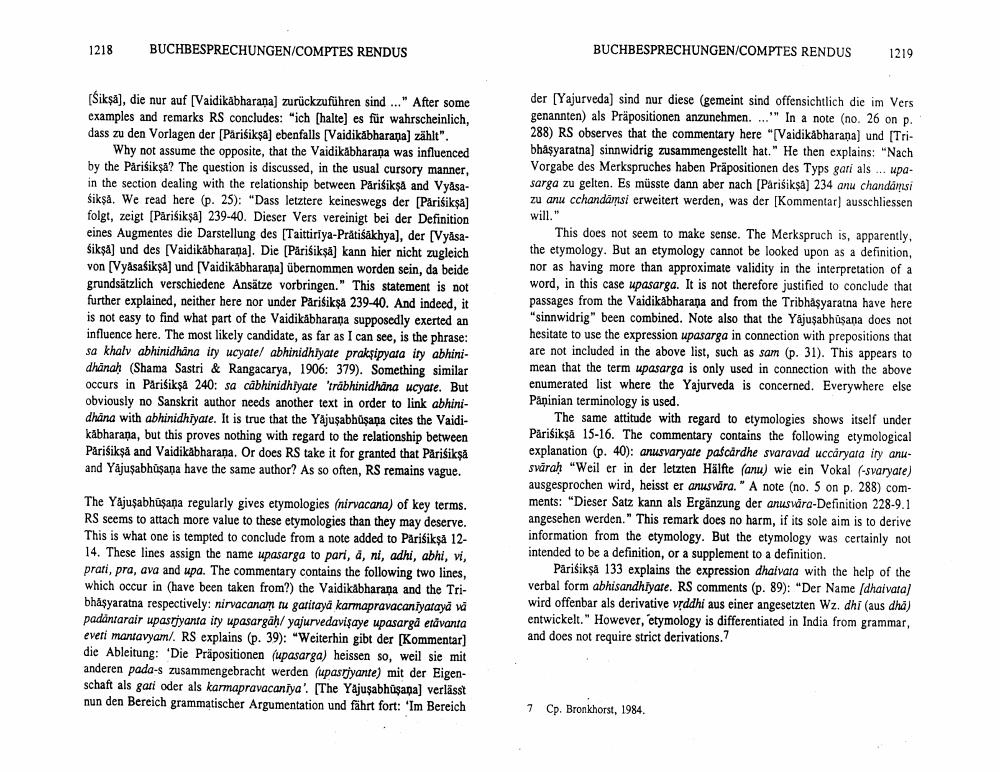Book Title: Buchbesprechungen Comptes Rendus Author(s): Johannes Bronkhorst Publisher: Johannes Bronkhorst View full book textPage 5
________________ 1218 BUCHBESPRECHUNGEN/COMPTES RENDUS BUCHBESPRECHUNGEN/COMPTES RENDUS 1219 (Siksa), die nur auf (Vaidikabharana) zurückzuführen sind ..." After some examples and remarks RS concludes: "ich (halte) es für wahrscheinlich, dass zu den Vorlagen der (Parisikşa) ebenfalls [Vaidikabharana) zählt". Why not assume the opposite, that the Vaidikabharana was influenced by the Parisiksa? The question is discussed, in the usual cursory manner, in the section dealing with the relationship between Parisiksa and Vyasasiksa. We read here (p. 25): "Dass letztere keineswegs der (Parisikşa] folgt, zeigt (Parisiksa) 239-40. Dieser Vers vereinigt bei der Definition eines Augmentes die Darstellung des [Taittiriya-Prätiśákhya), der (VyasaSiksa) und des (Vaidikábharana). Die (Parisikša] kann hier nicht zugleich von (Vyasasikşa) und (Vaidikabharana) übernommen worden sein, da beide grundsätzlich verschiedene Ansätze vorbringen." This statement is not further explained, neither here nor under Parisiksa 239-40. And indeed, it is not easy to find what part of the Vaidikabharana supposedly exerted an influence here. The most likely candidate, as far as I can see, is the phrase: sa khaly abhinidhana iry ucyate/ abhinidhiyate praksipyata iry abhinidhānah (Shama Sastri & Rangacarya, 1906: 379). Something similar occurs in Parisiksa 240: sa cabhinidhiyate 'trabhinidhana ucyate. But obviously no Sanskrit author needs another text in order to link abhinidhana with abhinidhiyate. It is true that the Yajuşabhusana cites the Vaidikabharana, but this proves nothing with regard to the relationship between Parisikså and Vaidikabharana. Or does RS take it for granted that Pärisikşa and Yajuşabhūsana have the same author? As so often, RS remains vague. der (Yajurveda) sind nur diese (gemeint sind offensichtlich die im Vers genannten) als Präpositionen anzunehmen. ..." In a note (no. 26 on p. 288) RS observes that the commentary here "(Vaidikabharana) und [Tribhâsyaratna) sinnwidrig zusammengestellt hat." He then explains: "Nach Vorgabe des Merkspruches haben Präpositionen des Typs gari als ... upasarga zu gelten. Es müsste dann aber nach (Parisikşa] 234 anu chandansi zu anu cchandárrisi erweitert werden, was der [Kommentar) ausschliessen will." This does not seem to make sense. The Merkspruch is, apparently, the etymology. But an etymology cannot be looked upon as a definition, nor as having more than approximate validity in the interpretation of a word, in this case upasarga. It is not therefore justified to conclude that passages from the Vaidikabharana and from the Tribhasyaratna have here "sinnwidrig" been combined. Note also that the Yajusabhusana does not hesitate to use the expression upasarga in connection with prepositions that are not included in the above list, such as sam (p. 31). This appears to mean that the term upasarga is only used in connection with the above enumerated list where the Yajurveda is concerned. Everywhere else Paninian terminology is used. The same attitude with regard to etymologies shows itself under Parisikşå 15-16. The commentary contains the following etymological explanation (p. 40): anusvaryate pascardhe svaravad uccaryata iry anusvārah "Weil er in der letzten Hälfte (anu) wie ein Vokal (-svaryate) ausgesprochen wird, heisst er anus vāra. A note (no. 5 on p. 288) comments: "Dieser Satz kann als Ergänzung der anus vara-Definition 228-9.1 angesehen werden." This remark does no harm, if its sole aim is to derive information from the etymology. But the etymology was certainly not intended to be a definition, or a supplement to a definition. Parisiksa 133 explains the expression dhalvata with the help of the verbal form abhisandhiyare. RS comments (p. 89): "Der Name (dhaivata) wird offenbar als derivative veddhi aus einer angesetzten Wz. dhi (aus dha) entwickelt." However, etymology is differentiated in India from grammar, and does not require strict derivations. 7 The Yajusabhusana regularly gives etymologies (nirvacana) of key terms. RS seems to attach more value to these etymologies than they may deserve. This is what one is tempted to conclude from a note added to Parisikşå 1214. These lines assign the name upasarga to parl, a, ni, adhi, abhi, vi, prari, pra, ava and upa. The commentary contains the following two lines, which occur in (have been taken from?) the Vaidikabharana and the Tribhasyaratna respectively: nirvacanam tu garitaya karmapravacanlyataya va padántarair upasriyanta ity upasargah/yajurvedavişaye upasargå etāvanta everi mantavyam/ RS explains (p. 39): "Weiterhin gibt der (Kommentar) die Ableitung: Die Präpositionen (upasarga) heissen so, weil sie mit anderen pada-s zusammengebracht werden (upastjyante) mit der Eigenschaft als gati oder als karmapravacaniya'. [The Yajusabhūsana) verlässt nun den Bereich grammatischer Argumentation und fährt fort: 'Im Bereich 7 Cp. Bronkhorst, 1984.Page Navigation
1 ... 3 4 5 6 7 8
